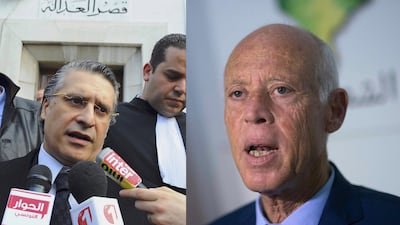Law professor Kais Saied and detained media mogul Nabil Karoui won most votes in the first round of Tunisia's presidential election and will contest a runoff vote, the independent electoral commission (ISIE) said on Tuesday.
The date of the second round has yet to be determined but is expected to fall either in late September or October, depending upon any legal challenges to the results of the first round.
After two days of counting, the ISIE confirmed Mr Saied had taken 18.4 per cent of the vote, 2.82 points ahead of the runner up, Mr Karoui.
The closest establishment rival to the two populist outsiders was Abdelfattah Mourou of the moderate Islamist Ennahda party, who captured 12.88 per cent of the final vote.
Defense Minister Abdelkarim Zbidi and Prime Minister Youssef Chahed languished behind with just 10.7 and 7.3 per cent respectively.
Reacting to the news, Samy Ashour, a senior official with Mr Karoui's Heart of Tunisia party acknowledged the scale of the result but cautioned that if their candidate was not in prison it could have been even more significant.
"There was a counter-campaign, to say you couldn't vote for someone in prison, but most people saw through it. They didn't give up. It's not a vindication, but it's a big win," he told The National.
The progression of Mr Saied and Mr Karoui to the final round signals an emphatic rejection of Tunisia’s political class and an outright rejection of the party factionalism that has slowed much of the country’s progress, including issues like establishing a Constitutional Court.

Many saw the results from Sunday as showing that Tunisia’s public is hungry for action.
"It's a vote against a political class that failed at delivering on virtually every level," Lamine Benghazi of the parliamentary watchdog Al Bawsala said. "In terms of economic justice, in terms of employment, it failed at putting in place functional and decent public services for everyone, especially in the health and education sectors.
“It's a vote against a political class plagued by stories of corruption and that offered a sad spectacle throughout these years by focusing solely on petty political schemes instead of improving people’s lives,” he said.
Public antipathy to Tunisia’s political class goes some way to explaining the rise of Mr Saied in the first round.
Of the large billboards featuring the faces of this year’s Presidential contenders, few carry his likeness.
Campaigning by the academic has been almost nonexistent, party affiliations rejected and public appearances were largely confined to guest spots on political talk shows to discuss his platform.
Of the two candidates, Mr Saied offers a populist, though socially conservative, programme to his imprisoned rival.
Having described homosexuality as a ‘sickness’, Mr Saied has also called for an ending of the current moratorium on the death penalty, in effect since 1991.
He has promised to return power to the people, abolishing parliamentary elections in favour of having a legislative body appointed by local and regional councils.
Underscoring his populist base, he has renounced any claim to the Presidential Palace in the prosperous suburb of Carthage, stating instead that he will remain at home.
By contrast, Mr Karoui’s platform promises the reverse to Mr Saied’s vision of bottom-up democracy.
Making significant play of his philanthropic work amongst Tunisia’s poor, Mr Karoui has called for a “pact against poverty” that would bring together all political parties and national organizations to oversee an urgent, “action plan to meet the needs of the poor in terms of food, housing, transportation and health," his program said.
Mr Karoui has also campaigned to give more power to the president so he can intervene to correct many of the social ills that currently roil Tunisia. He also wants to combine all of the security forces under a single command.
Despite his incarceration on charges of money laundering and tax evasion – charges he denies – Mr Karoui’s campaign has dominated public discussion of the elections. Many Tunisians have feverishly debated the timing and motivations behind his current trial for the 2016 allegations, as well as the other legal impediments placed in his way.
Certainly, having a candidate campaign for the presidency from his prison cell is a unique circumstance for Tunisia. Moreover, should both the legal case against him as well as his campaign for high office proves successful, one that presents an equally individual dilemma.
While Mr Karoui’s campaign is confident that an electoral win would immediately see their candidate escorted from prison to the palace by the Presidential Guard, others are less confident.
“There are numerous interpretation,” of the law, Mr Benghazi explained. “Some people say that he, [Mr Karoui] won't be able to get into office given that he won't be able to swear allegiance. Some others think that a formality is a formality and that he will be automatically president if he wins the elections, with or without swearing allegiance.”
Typically, an issue such as this would fall under the auspices of the Constitutional Court, mandated within Tunisia’s 2014 constitution.
However, delays in its formation have left the country reliant upon a provisional body that carries little of the weight of its supposed successor.
Should the uncertainty not be resolved before the second round of elections, the country risks being plunged into a Constitutional crisis that few ever envisaged.
How this uncertainty may influence support for Mr Karoui’s rival, Mr Saied, remains to be seen.













